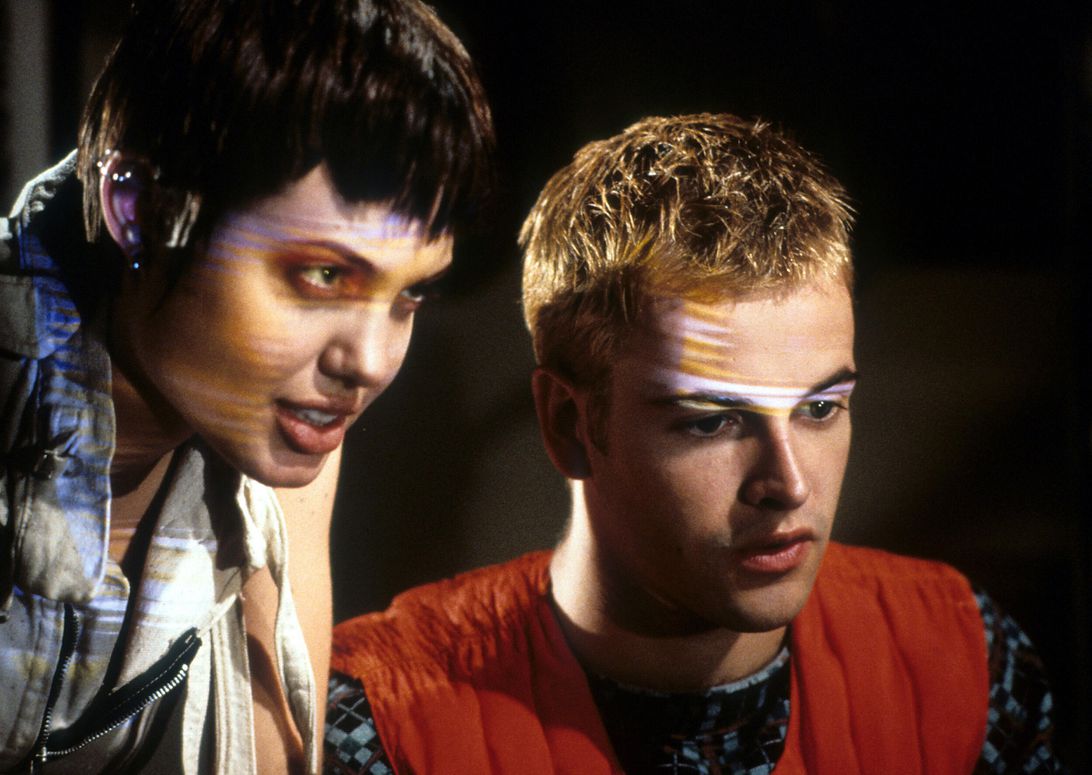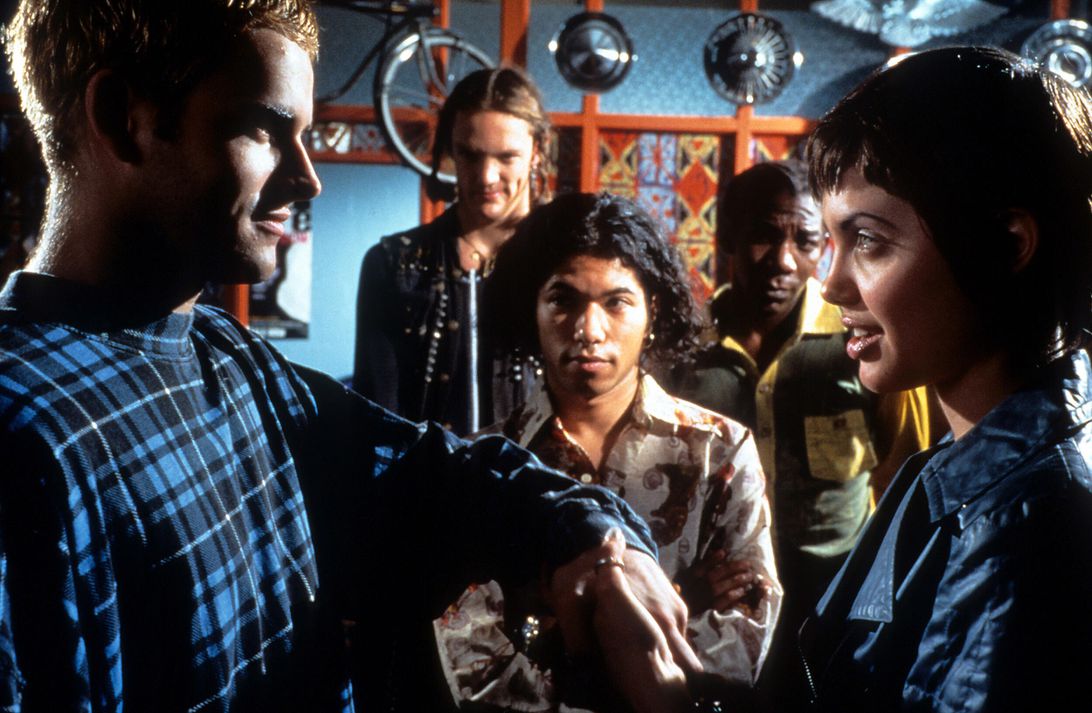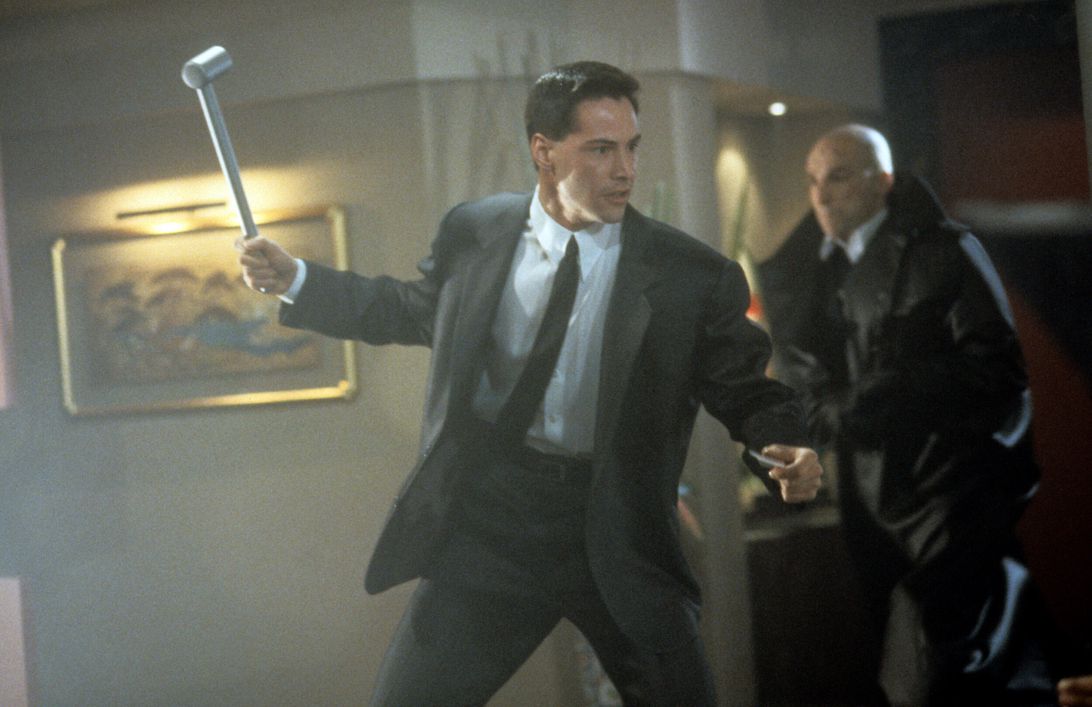Net. Hackers. Johnny Mnemonic. 25 years ago, cinema met cyberspace in a whirlwind of crazy fashion, cool music and surveillance paranoia

Angelina Jolie and Johnny Lee Miller hack the planet in 1995's Hackers.
In 1995, the CNET website appeared, Microsoft launched Internet Explorer, and Bill Gates dubbed the Internet the "wave of infatuation." And that same year, Hollywood launched its own wave of passion for films flirting with cyberspace and the upcoming information age.
It all began in May 1995 with the release of Johnny Mnemonic , a slightly rambling sci-fi dystopia with Keanu Reeves, based on the cyberpunk work of prolific author William Gibson (which he is believed to have founded). In July, Sandra Bullock's identity was erased in the conspiracy thriller The NetworkIn August, Denzel Washington chased computer-generated serial killer Russell Crowe in Virtuosity . In September, Angelina Jolie found her breakout role in the anarchist-adventure Hackers . In October, Katherine Bigelow gave us the dystopian thriller Strange Days .
It's hard to say what is more outdated in this antiques from the mid-90s: primitive effects, artsy fashion or clumsy technologies shown on the screen. But today, 25 years later, they look prophetic in their concerns about surveillance, corporate power, and corruption in a new era that once seemed delightfully democratic.
New rock and roll
Hollywood lagged behind the growing popularity of personal computers. Aside from scary sci-fi computers like HAL from A Space Odyssey 2001 , we only remember War Games in 1983 and Tikhushnikov in 1992 - both scripts written by the same man, Lawrence Lasker. Also in 1992, we got to know "The Lawnmower Man ", and cyber jesus from virtual reality.
By then, Tim Berners-Lee had already invented a worldwide network of pioneers, cutting edge scientists, opportunistic entrepreneurs and a thriving community of eccentric cyber geeks. In the early years, the network was replenished with new members every September - since one of the few ways to access the Internet was provided by university computers. However, in 1993, AOL gave users access to Usenet, after which suddenly new users began to appear daily. It was " eternal September " and the web was already booming.
The movie studios were eager to touch this hype. “It was a hot topic, and we felt like we were racing for it,” recalls Ralph Winter, one of the producers of Hackers. "We even felt we were late."

Meet the hackers: Lawrence Mason, Jesse Bradford, Renoli Santiago, Matthew Lilard, Angelina Jolie and Johnny Lee Miller.
Hackers author Rafael Moreau came up with the idea after meeting Emmanuel Goldstein - real name Eric Corley - publisher of 2600: The Hacker Quarterly . Moreau's script fell into the hands of British director Ian Softley, who had just filmed Backbeat about the early days of the Beatles. Softly grasped parallels between young hackers, who he saw as young criminals, and revolutionaries. “For me it was no longer a film about technology, but a film about popular culture,” Softley told me over the phone while quarantined in London. "It was a turning point, the beginning of something new, something like rock and roll."
One of these criminals was Nicholas Jarecki, who was hired as a technical consultant. Now he is making films himself, at the moment he is finishing the crime thriller "Dreamland" with Armie Hammer and Gary Oldman, interrupting filming due to the coronavirus. He got introduced to show business in the early 1990s, when he was 15 years old, and he hung out with Goldstein and other hackers on the first Friday of every Monday in the lobby of New York City's skyscraper Citigroup Center. “I was at one of the meetings,” Jarecki recalls, “and it includes Ian Softley, Johnny Lee Miller and Angelina Jolie. As if the circus had arrived. They seemed to me the coolest people on Earth. "
Hack the planet
"Hackers" were remembered for their neon fashion, ornate hairstyles and cutting-edge electronic soundtrack, which included songs from the likes of The Prodigy, Leftfield, Orbital and Underworld (as well as uncredited David Gilmour of Pink Floyd). “I had no idea how unusual the movie we were filming in terms of costumes and music,” says Softley, who drew ideas for the strange color palette and parallel underground culture from psychedelics infused with LSD. “I wanted to film what we called 'cyber-delusion' - a technological hallucination.”
And they definitely succeeded in terms of a dizzying visualization of the Internet, in the form of flying through dazzlingly painted three-dimensional towers of data, something like a virtual cityscape, consisting of bits and bytes. Ironically, these cyberspace effects were created using traditional techniques such as animation and rotoscopy, not computers. "Hackers" did not make it several years (or a few dollars) until such digital breakthroughs of the 90s as "Toy Story", "Titanic" and the first prequel to "Star Wars".
Fortunately, United Artists gave Softley carte blanche to bring her ideas to life. “At the time, I didn't realize how daring they were,” he says. - Since then this has not happened! "
Meanwhile, the opposite was happening for competitors in Canada. Video artist and director Robert Longo dreamed of making a black and white art house film based on the story by William Gibson "Johnny Mnemonic". In the story, a courier loads digital files into an implant located in his brain. Gibson wrote the script, but despite his successes as a bestselling author such as the cyberpunk novel Neuromancer - in which he coined the term "cyberspace" - they found it difficult to find the $ 1 million they were looking for. “You're just asking for too little,” Gibson Longo said, and Sony's Tristar ended up donating money for a big movie starring Val Kilmer. After Kilmer dropped out of the project, Keanu Reeves was recruited, and when Speed made him an action superstar,Tristar's expectations for the new film have grown exponentially. They saw him as a summer blockbuster.
The managers demanded reshoots, complained that the action in the film was not taken seriously, and the picture was too dark. Longo had to use guerrilla filming techniques on his own set - he worked with the camera on his own while the film crew ate lunch to get the shots he wanted. Describing this in a telephone conversation that Longo has with me from New York, he spices up his memories with funny stories, telling who was the "evil", "goat", "idiot" or "damn idiot."
"Don't get me wrong, a lot of great people have worked with me," says Longo. He fondly recalls executive producer Staffan Arenberg, who helped get the production started, and production designer Nilo Rodis-Hamero, who developed the film's explosive aesthetic. were taken and re-edited to rival the summer box office with Braveheart, Die Hard 3 and Batman Forever (which starred Val Kilmer).
“I'd say I like about 55% of the film,” Sighs Longo.
The film may be messy, but you can't blame it for lack of ideas. The eclectic cast includes rapper Ice-T, punk rock musician Henry Rollins, Japanese idol Takeshi Kitano in a rare role with English-language cues, Dolph Lundgren, dressed as Jesus, and a dolphin, a retired soldier who can read minds. Drawing inspiration from his books, Gibson has created a nightmarish near-term future for "late-stage capitalism" plagued by violent corporations and disorderly body modifications.

Keanu Reeves as Data Courier Johnny Mnemonic in the 1995 cyberspace thriller.
One of the film's leitmotifs is a passion for technology. Longo compares Johnny Mnemonic's “parasitic” brain implants to modern smartphones and other devices that we experience as a kind of phantom limb. As the character of Henry Rollins says in the film: "The electronics around you poison the ether ... But we still run around with this junk, because we cannot live without it."
Johnny Mnemonic and the other 1995 tech films most vividly express fears of surveillance abuse in a connected world. "The Network" renews the paranoia of the 70s, expressed in the thrillers "The Conversation " and " Anderson Tapes ""- and each of the films features a wicked alliance of greedy corporate villains and authoritarian law enforcement. Or, as Matthew Lillard's character in The Hackers puts it," Orwell is already with us and is on his way! "
However, the informers, heroes of Hackers, The Networks and Johnny Mnemonics, use their skills to subvert and wrest technology from the establishment. Hackers are particularly powerful in their infectious idealism, as a motley group of anarchist youth circles around greedy functionaries and unsuspecting cops, “spying on them, as they spy on us.” Cinema reveals the potential of technology as a tool for pranks and a democratic environment where anyone can become who they want.
“For all its exaggeration,” says Nicholas Jarecki, “the picture does a good job of showing the hacker spirit. These guys were experimenters, inventors who enjoyed their ability to figure things out. This is the praise of human genius. "
Unfortunately, the 1995 tech film wave had one other thing in common. They all failed.
The whole world logged into the next millennium, and Hollywood didn't have a password to it. Piracy began to harm the film and music industries, with online entertainment diverting audiences away from cinemas to smaller screens. The Network turned into a short-lived TV series, and Hackers became a cult classic - an anniversary soundtrack release next year on vinyl - but filmmakers have been struggling to cope with the Internet as the theme of films.
Aside from bizarre hits such as the e-mail romantic comedy " You've Got Mail " from 1998 and David Fincher's Oscar-winning film "The Social Network, " Internet movies have had mixed success. There are tons of horror movies out there with titles like Feardotcom , Chatroom andCam , as well as a whole subgenre of thrillers revolving around computer screens - Unfriended , Open Windows and Searching . None of the modern action films are complete without a man staring gloomily at the screen during a mainframe hack, such as in the thrillers Swordfish Password , Die Hard 4.0 or Mission Impossible series, but no one needs films. condemning addiction to social networks - " No connection ", " Men, women and children ."
The final point in cinematic cyberspace was put by another cyberpunk action movie with Keanu Reeves from the 90s - " The Matrix", a hit in 1999. By that time, visualizing data in the form of cities was already silly - remember only the belated sequel Tron: Legacy - since we already understood that we would not fly over the neon landscapes of virtual reality.
But at the same time, Hackers, The Network and Johnny Mnemonic are still worth watching. Never mind outdated technology and clothing, watch an imperfect but interesting snapshot of the moment the Internet took over the world. Those films inspired and influenced today's experts, and Ian Softley before He still shows and discusses The Hackers at various technology fairs around the world. "The film allowed them to think of technology as cool," he says. "It was disrespectful, bold, provocative, energetic - kind of a funny cyber tale."
See also: